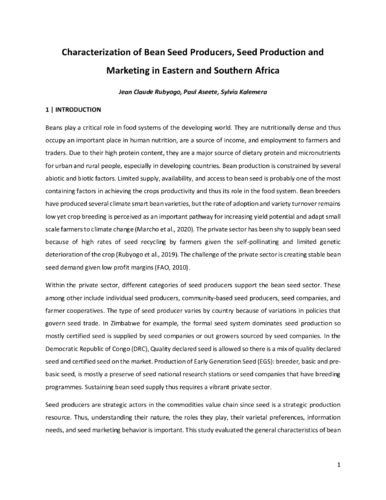Characterization of bean seed producers, seed production and marketing in Eastern and Southern Africa
Limited supply, availability, and access to bean seed is probably one of the most containing factors in achieving the crops productivity and thus its role in the food system. Bean breeders have produced several climate smart bean varieties, but the rate of adoption and variety turnover remains low yet crop breeding is perceived as an important pathway for increasing yield potential and adapt small scale farmers to climate change (Marcho et al., 2020). The private sector has not been keen to supply bean seed because of high rates of seed recycling by farmers given the self-pollinating and limited genetic deterioration of the crop (Rubyogo et al., 2019). The challenge of the private sector is creating stable bean seed demand given low profit margins (FAO, 2010).
Within the private sector, different categories of seed producers support the bean seed sector. They include individual seed producers, community-based seed producers, seed companies, and farmer cooperatives. The type of seed producer varies by country because of variations in policies that govern seed trade. In Zimbabwe for example, the formal seed system dominates seed production so mostly certified seed is supplied by seed companies or out growers sourced by seed companies. In the Democratic Republic of Congo (DRC), Quality declared seed is allowed so there is a mix of quality declared seed and certified seed on the market. Production of Early Generation Seed (EGS): breeder, basic and pre-basic seed, is mostly a preserve of seed national research stations or seed companies that have breeding programmes. Sustaining bean seed supply thus requires a vibrant private sector.

